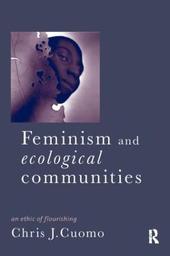
|
Feminism and Ecological Communities: An Ethic of Flourishing
Paperback
Main Details
| Title |
Feminism and Ecological Communities: An Ethic of Flourishing
|
| Authors and Contributors |
By (author) Chris J. Cuomo
|
| Physical Properties |
| Format:Paperback | | Pages:192 | | Dimensions(mm): Height 234,Width 156 |
|
| Category/Genre | Environmentalist, conservationist and green organizations
Applied ecology |
|---|
| ISBN/Barcode |
9780415158060
|
| Classifications | Dewey:333.7082 |
|---|
| Audience | | Undergraduate | | Postgraduate, Research & Scholarly | | Professional & Vocational | |
|---|
| Illustrations |
black & white illustrations
|
|
Publishing Details |
| Publisher |
Taylor & Francis Ltd
|
| Imprint |
Routledge
|
| Publication Date |
25 December 1997 |
| Publication Country |
United Kingdom
|
Description
Presenting a rethinking of the ecofeminist movement, this text acknowledges the importance of postmodern feminist arguments against ecofeminism whilst presenting a strong case for ecofeminism. The author traces the emergence of ecofeminism from the ecological and feminist movements before clearly discussing the weakness of some ecofeminist positions. Exploring the dualisms of nature/culture and masculine/feminine that are the bulwark of many contemporary ecofeminist positions and questioning traditional feminist analyses of gender and caring, the book asks whether women are essentially closer to nature than men and whether we are right to link the oppression of women and minority groups to the degradation of nature. The author addresses these key issues by drawing on recent work in feminist ethics as well as the work of diverse figures such as Aristotle, John Dewey and Donna Haraway.
Reviews"Her book is both philosophically sophisticated and intellectually honest."-"WE International "An important contribution to the critical literature on feminist and ecological feminist thought }."-Val Plumwood, University of Tasmania ""Feminism and Ecological Communities is invaluable for its discussion of competing theories of oppression, particularly the oppression of what has been thought natural. From where I stand, this is a very important and enlightening book Maria Lugones, Binghamton University.""A highly engaging and radical work of feminist scholarship."-Loren Gruen, Lafayette University
|